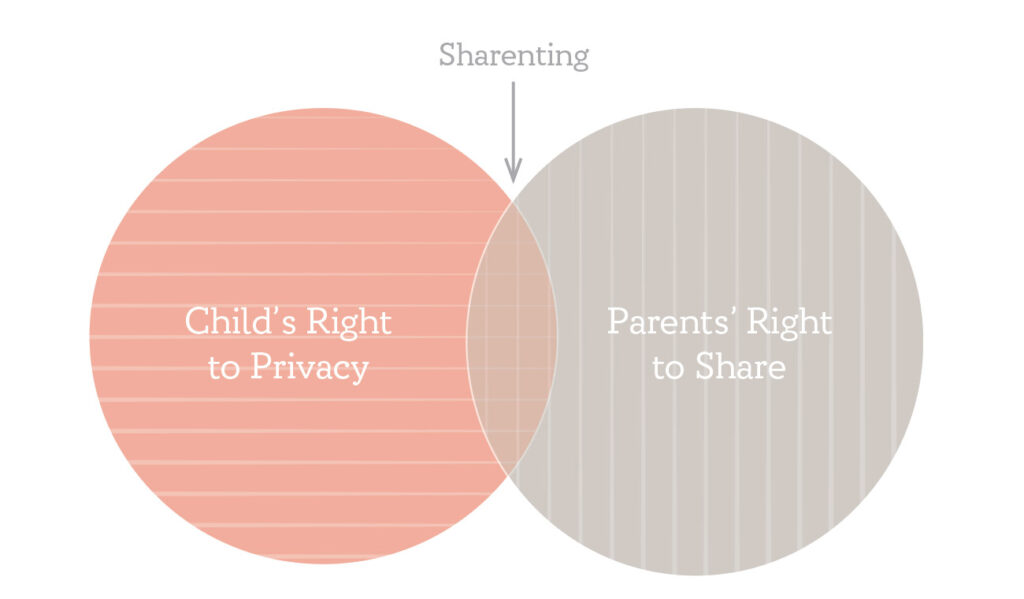When the United Nations, the American Academy of Pediatrics or The Wall Street Journal need insight on sharenting — the term coined for posting about your kids online — they turn to the University of Florida’s Stacey Steinberg.
As the author of the book “Growing Up Shared: How Parents Can Share Smarter on Social Media and What You Can Do to Keep Your Family Safe in a No-Privacy World,” Steinberg recognizes the benefits and risks of posting content about kids and wants families to understand them, too.
“I went into this work not to stop people from sharing, but because I love to share, and I found so much good coming out of it,” says Steinberg, who leads the Levin College of Law’s Center on Children and Families.

But as much as she enjoys posting the typical proud-parent moments of her three kids, she knows seemingly harmless photos and information can have unintended consequences — especially when sharing settings allow them to be seen outside of a small circle of friends and family. She cites a study from the bank Barclays predicting that by 2030, almost two-thirds of identity theft cases will stem from what parents post about their kids. (Think about typical account-security questions like mother’s maiden name or first pet: It wouldn’t take long for scammers to dig up those answers on our social profiles.) Then there’s the new threat of pornography created by editing innocent pictures posted online.
Alongside criminal dangers, Steinberg contemplates sharing’s impact on children’s privacy. Before they create their own social media presence, today’s kids have a digital identity crafted by everything that’s been posted about them — an identity they often have no control over.
Steinberg, who got her undergraduate and law degrees at UF, began to wonder about children’s rights to privacy online after joining her alma mater as a legal studies professor. When she started posting content about her kids on her (now-deleted) blog and, later, on social media, she didn’t worry much about the long-term impacts. But when she weighed the issue from a legal perspective, she could see potential harms beyond their safety and security.
It’s easy to view our kids’ stories as our own. You’d be unlikely to spill all the details of a silly or embarrassing story about a friend on Facebook, but as parents, we do that to our kids all the time. What seems cute now might be mortifying or even harmful later: Imagine a prospective employer searching your name online and finding a potty training video as the first result. That led Steinberg to ponder if kids — especially older ones — have a say in what’s shared about them, and if so, how it coexists with parents’ free speech rights.
“Children may have an interest in controlling their digital footprints now or years in the future,” Steinberg says.
In 2015, Steinberg wrote an essay for The Washington Post calling for deeper contemplation of kids’ digital footprints, calling it “the parenting issue of our generation.” She thought it was a one-off, but fellow UF Law professor Lyrissa Lidsky and then-dean Laura Rosenbury, also a children’s rights scholar, encouraged Steinberg to study the issue.
“Honestly, I thought that was my magnum opus. That was the last thing I was going to write,” Steinberg recalls. “But when I mentioned the article to Dean Rosenbury, she thought it was fascinating and so important.”
What followed was the book, a TED talk in Vienna, and countless articles in news outlets and law journals, and her work being cited by UNICEF. Still, she resists being labeled an expert.

“I hate the word expert because I am totally living my own social media experiment in my house,” she says. “I have three very, very different kids that have different levels of comfort with how they’re portrayed online and I want to respect their differences. There’s not one right way to do it.” (See sidebar for her tips on finding the right balance for your family.)
She’s also quick to point out she didn’t coin the word “sharenting” — she doesn’t even like it. “It sounds judgmental, and it’s kind of a silly word,” she says.
In some countries, though, legal limitations on sharenting are serious business. A Dutch woman was ordered to take down photos of her grandkids from Facebook and Pinterest in 2020 after posting them without permission from their mother. In 2023, France drafted legislation to hold parents accountable for protecting children’s privacy. Don’t expect anything like that in the United States, which has no constitutionally enshrined right to privacy and favors a parents’ rights approach, Steinberg says. In fact, the U.S. is the only member state not to ratify the United Nations Convention on the Rights of the Child.
Steinberg’s research has persuaded her that the best way to protect children’s’ privacy might not be a legal remedy. Instead, she envisions a public-health solution, not unlike the campaign that encouraged safer sleep practices for babies to prevent Sudden Infant Death Syndrome. A widespread effort to teach families online safety could make a difference, she says.
“As much as we need people researching the risks and legal solutions, we need people to find successful methods to communicate this in ways that don’t judge,” she says.
While her public outreach made strides toward that goal, Steinberg is shifting her focus. She’s still balancing almost-daily requests for media interviews three years after the book’s publication, but the former special victims unit prosecutor is devoting more time to directing the Gator TeamChild Juvenile Law Clinic, which provides free legal services to kids in foster care. She’s also guiding students through their own research on kids’ online privacy, which has taught her that parents-to-be who grew up with social media will approach sharenting differently.
“I absolutely think that the next generation of parents will share less,” she says.
Steinberg doesn’t want to stop people from sharing joyful updates about the kids they love. She just wants families to understand how to enjoy the best parts of social media while avoiding harm.
“My goal,” she says, “is to protect kids in the long run.”
How to safeguard kids (and their privacy) when posting on social media
Tips from UF legal scholar Stacey Steinberg
Limit details. When writing posts, using a nickname or initials in place of the child’s name can help keep kids and their identity safe. Be cautious about locations, too. You might not want to name their school or check in at their sports practice field.
Get consent. Ask the child if it’s OK to take and share a photo, and follow their wishes — it not only gives them a voice in their digital presence, but teaches them good habits for their future social accounts. “For a preschooler, you might say, ‘I’m really proud of you and excited about your science project, or your art piece. Are you good with me telling my friends? Are you good with me telling your grandma and grandpa?’ As they get older, that becomes more specific. In their tweens, you might be discussing why someone might not want something to be shared.”
Look back. Periodically review any social media accounts where you share about your kids to check your privacy settings. Steinberg also likes to review older posts and delete or change the visibility of photos that might not need to be as widely available as they once were. “It gives you a chance to say, ‘Have we shared in a manner that that was okay with our kids at 4 but isn’t okay with our kids at 14? Do we need to take things down?”

Post later. Instead of posting about that piano recital or spelling bee win in the moment, consider waiting. That way, you’re not only keeping your focus in the room with your child, you’re modeling good practices. “When our kids see us step out of the moment to share a picture instead of waiting, they take note,” Steinberg says.
Share together. Parents can consider a family account that older kids help curate, which can help them think through the decisions they’ll make when they get their own accounts. Without supervised practice, “it’s a bit like giving a child a driver’s license without ever giving them a chance to sit alongside us and learn to drive,” she says.
Vent carefully. Social media can be a crucial source of support when struggling with tough parenting issues, but consider who has access to posts that discuss details about your child’s behavioral or academic issues. While it may seem far-fetched, the data-sifting power of artificial intelligence could mean that public posts impact kids’ future job or college prospects.
No nudity. No matter how innocent a bathtub photo or other nudity seems, it’s too accessible to child pornographers once it’s shared online.
Reach out. It’s not just your own posts, but details shared by your extended family, friends, schools, religious groups, and extracurriculars. “Don’t shame others, but let loved ones know you’re steering when it comes to your child’s digital footprint,” Steinberg says. You might want to set up a Google alert for your child’s name, and ensure that your settings require approval for photos to be tagged. If an organization your child is involved with doesn’t have a social media policy, you could offer to create one.
Source:
Stacey Steinberg
Master Legal Skills Professor
steinberg@law.ufl.edu

